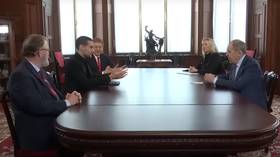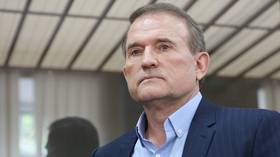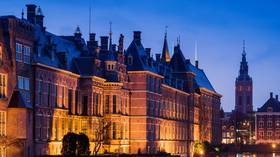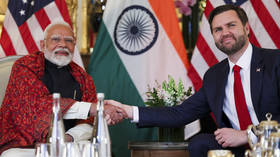Bolivia’s coup: Morales toppled not due to his failures, but due to his success
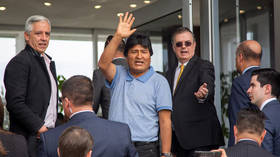
Questions remain about the circumstances that led to Morales’ ouster, and whether foreign governments played a role in it. But recent history provides reason to suspect that Bolivia’s rich natural resources are part of the answer.
In a near empty room, a Bolivian military official placed the presidential sash over Jeanine Anez Chavez, a senator from the Beni region who didn’t run the country’s recent election. The ardently Christian politician carried a Bible with her into the ceremony, which consolidated the coup d’etat in the Andean country.
Meanwhile, the victor of the October 20 vote, Evo Morales, was just arriving in Mexico where he has been exiled by the very same actors who claim that no coup has taken place. After calling for new elections in an attempt to quell unrest over election fraud allegations, Morales resigned when military and police heads ‘suggested’ he step down, though only after failing to protect activists and election officials from Morales’ left-wing Movement For Socialism (MAS) party.
Though there is still certainly a lot of questions around the circumstances that led to the ouster of Morales, how it happened and why it did are clearer.
The first thing to look at is how he was forced from the presidency and, then, from the country.
Ecuador’s Lenin Moreno continues to occupy the Carondelet Palace despite a brief relocation to Guayaquil as he faced mass protests over an austerity package, while Chilean President Sebastian Pinera is hanging onto power despite over three weeks of massive, daily protests that have pushed his approval rating to nine percent.
Also on rt.com Post-coup Bolivia anarchy ‘resembles Libya’: Putin urges ‘common sense’ amid Latin American chaosThe recent examples of Chile and Ecuador show that a government isn’t necessarily toppled by large numbers on the street, and whereas US allies Moreno and Pinera have the backing of their respective militaries, Morales did not.
The reasons why Morales’ government was toppled are not due to some failures, but rather due to its success.
Morales’ Bolivia had been hailed by numerous observers and organizations for its impressive gains in practically every social indicator, including reducing inequality, making significant gains for women, and many others.
Under the former coca farmer’s leadership, Bolivia had finally managed to reach a level of political stability that evaded it for decades. Nonetheless, Morales was forced out of the country in a matter of days.
The strength of Bolivia’s economy has precisely been driven by its left-wing and nationalist inclinations.
Early into his first term, Evo nationalized the country’s natural gas – the second-largest reserves in South America after Venezuela. This allowed the government to start spending on its people as well as its infrastructure.
Also on rt.com Russia considers power shift in Bolivia a coup, but will work with Anez as interim president – Deputy FMThe socialist government got into numerous battles with companies over the control of the country’s resources, often having to issue some form of compensation for affected firms, but obviously not detrimentally impacting Bolivia’s economy.
Though Morales’ government still owed much of its success to its natural gas (which again, it controlled), they had also been looking to diversify the economy and had been eyeing its lithium as a key to the country’s economic future. The mineral is essential for electric vehicles, and Bolivia has tons of it – upwards of three-quarters of the world’s total reserves (according to Bolivians).
Despite the value of the mineral, conditions placed on investors led to challenges in securing capital, though Germany’s ACISA and Chinese firms such as TBEA Group and China Machinery Engineering eventually came to terms with Bolivia’s national lithium company, Yacimientos de Litio Bolivianos (YLB).
However, just a week before his forced resignation, Morales canceled the ACI deal in Uyuni salt flat due to protests. In a letter to Germany’s economy minister on November 6, ACISA’s president said he was surprised, but also “sure that our lithium project will resume.”
For some, Evo’s positioning on lithium, including his opening up to Chinese capital, is the reason he was ousted.
While there can be little more than speculation at this point, others point to a long trail of shadowy interventions for control of resources in the region.
“Bolivia is very rich, it is said that it has 70 percent of the essential material to make the new batteries. We all know that there is a change in energy taking place in the world,” former Uruguayan president Jose Mujica said.
Also on rt.com Post-coup Bolivia anarchy ‘resembles Libya’: Putin urges ‘common sense’ amid Latin American chaos“I am not accusing anyone, because I have no proof, but I distrust because of history.”
The not-too-distant history clearly supports Mujica’s grounds for suspicion.
The US Agency for International Development and the National Endowment for Democracy (NED) has long thrown millions of dollars at Bolivian opposition groups and NGOs precisely as part of destabilization efforts including violent, anti-government protests in Santa Cruz, which just happens to be where Civic Committee leader and Christian zealot Luis Fernando Camacho is based.
The two Bolivian security forces heads who ‘suggested’ Morales resign – police chief Vladimir Calderon and Commander of the Bolivian Armed Forces Williams Kaliman – were also graduates of the infamous School of the Americas and served as police and military attaches in the US in recent years. The US has made no secret of securing military and police officials in Latin America as assets.
Right now, the exact role that foreign governments and international capital played in the moves to oust Morales is moot, given the positive response from the hemisphere’s most reactionary leader, as well as from the markets.
Bolivia’s socialist leader earned the ire of the economic and political interests that he refused to subject his country to, and now he is being made an example of for it.
Think your friends would be interested? Share this story!
The statements, views and opinions expressed in this column are solely those of the author and do not necessarily represent those of RT.





